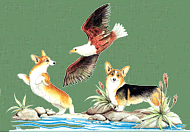Origins
Just
how or when the Corgi came to be, no-one knows for sure. Welsh
people know the sturdy little Corgi has been a familiar sight
watching over cattle and guarding the homesteads in Wales for
many centuries.
It
is generally believed that their ancestry dates back to at least
the tenth century. It is unknown whether they are descended from
the Swedish Vallhund or from the ancestors of the present-day
Schipperkes and Pomeranians that were brought to Wales by the
Flemish weavers.
Corgis
were recognised in the 1920s in the UK and, in 1934, the Pembroke
and Cardigan Corgis were recognised by the English Kennel Club
as separate breeds.
Daily
care
Corgis
require a proper diet and responsible medical care to ensure that
they have a long and happy life. Proper care also includes regular
exercise, grooming, and routine care of teeth and nails.
Please
do not allow your Corgi to become overweight. A correctly-proportioned
dog will live a longer, happier, healthier life. Pembrokes are
great con artists. Don't believe them when they tell you they're
starving immediately after a meal! Always feed a premium dog food
in the breeder's recommended amounts and avoid table scraps and
extra treats.
Your
Corgi will accept any amount of exercise - he is built to work
all day. He is an energetic dog and too much inactivity may cause
him to dream up unacceptable activities to amuse himself!
Training
Corgis
aim to please and like to be busy. With active, intelligent minds,
they quickly learn and eagerly approach a job that brings them
praise.
A
Corgi must be handled with clear, consistent commands, gentle
firmness and lavish praise.
Training
sessions should be brief, interesting and fun for the dog. The
result will be a happier dog and one that is bonded to you and
your family for the rest of his life.
To
spay or neuter?
The
breeding of dogs is a serious responsibility. Pembroke Corgis
are not easy to breed and it is an old wives tale to believe that
it is in the Corgi's interest to have puppies. Breeders and vets
alike will tell you emphatically that it is not at all helpful
or fulfilling for the bitch to have puppies. Whelping is a major
event for the bitch and, even under the most careful conditions,
it can lead to serious physical problems. Neutered animals are
normally healthier and usually live longer than those not spayed
or neutered.
Spaying
a bitch while she is still young greatly reduces the risk of mammary
tumours later in life and she will not suffer the danger of life-threatening
uterine infections as she grows older.
Neutering
a male removes the possibility of testicular cancer and it also
lowers the risk of prostrate problems. A neutered male will generally
be more tolerant of other males and if done when young, is far
less likely to mark his territory.
The
basic disposition of your Corgi will not be changed by spaying
or neutering. Neither of these procedures turn your pet into a
"fat and lazy couch potato". Overweight dogs are that
way through incorrect feeding, too many snacks and not enough
exercise.
Of
the two breeds, Pembrokes have become the more popular and some
owners have been tempted to breed them in a misguided effort to
make a profit. If you are able to make a profit breeding and selling
Corgis, you are not doing it with the care and concern you should
be exercising!
Only
quality Corgis should be bred by knowledgeable breeders in an
effort to improve the breed.
And
most important - remember to buy from a reputable breeder.
Breed
Clubs
If
you would like to join a group og breed enthusiasts who offer
advice, have meetings, fun shows, Corgi walks, Christmas parties,
etc. then please write to us and we will send you all the details
of Corgi Clubs in your area and particularly, the Corgi Club of
Gauteng.

See also:
~
Questions to ask a breeder
~ Questions a responsible breeder
will ask you
